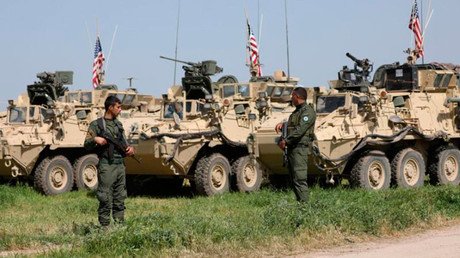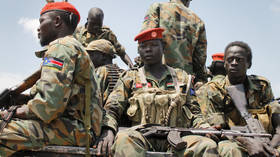'Kurds are pawns in US strategic games'
The US has a long history of supporting different Kurdish factions when it suits them and then pulling the plug when it no longer fits their interest, says Nicolas J. S. Davies, author of Blood On Our Hands: The American Invasion and Destruction of Iraq.
The Kurdish-led Syrian Democratic Forces (SDF) say they could join the government army if they're allowed to form a federal state in the north of the country.
The statement came after Turkey claimed the US president had promised to stop arming Kurdish forces.
However, there's apparently no clear position from the White House on the matter. White House Press Secretary Sarah Huckabee Sanders said the US is ready to “stop providing military equipment to certain groups" in Syria during a briefing on Monday.
Nicolas J. S. Davies, author, and political analyst, says Washington's pronouncements on the issue of arming the Kurds shouldn't be taken at face value.
“[The White House spokeswoman Sarah Huckabee] could be referring to Al-Qaeda linked armed groups in Idlib province in the northwest who have received thousands of tons of weapons over the years - mostly paid for by the Saudis but facilitated by the CIA to get all those weapons delivered mostly from the Balkans and South-Eastern Europe,” Davies said.
“If the White House isn’t letting on who it is they are talking about, somebody should ask them,” he continued.
“Obviously, [Trump] is under pressure from Turkey to do that and the Turks actually were the ones who said that he had told them that he was going to stop arming the Kurds. I think we have to wait and see exactly what this means,” he added.
In Davies’ view, “we should be very conscious that most of the arming of rebel groups in Syria by the US or its allies was done covertly. So, whatever they are saying publicly is not necessarily the whole story.”
He said that there are “a lot of holes” in statements both from the military and from the White House “that are big enough to drive ships, planes and trucks loaded with weapons through.”
“The US has a long history of supporting different Kurdish factions when it suits them and then pulling the plug when it no longer fits the US interest,” Davies pointed out.
“This goes all the way to the 1970s when the Iraqi government was fighting Kurdish rebels in Iraq and the US and Iran - which was still ruled by the Shah at that point – were supporting the Iraqi rebels. But then at a certain point in March 1975, Iran cut off the support for the Iraqi Kurdish rebels. And all the US relief and support going to the Kurdish refugees that had been coming through Iran just dried up overnight. And when the US House Intelligence Committee asked Henry Kissinger about this, he very famously told them that ‘covert action should not be confused with missionary work.' In other words, this was not about helping these Kurdish refugees, it was about using them as pawns in the US policy to destabilize Iraq,” he said.
He went on to recall that later when Saddam Hussein came to power, the situation was reversed.
“The US supported him, and by then, at the same time, there was a revolution in Iran and Iran stopped being a US ally. But the Kurds have been pawns in these strategic games that the US have been involved in for decades in that part of the world,” he told RT.
'It seems that governments are a lot more important than people for the US' – Iraqi Kurdish journalist https://t.co/XuJUYq7MSt
— RT (@RT_com) November 26, 2017
Daoud Khairallah, professor of International law at Georgetown University, Washington says he would not be surprised at all if the US stopped supporting the Kurds.
“The US realizes that its support of the Kurds has antagonized and alienated Turkey – its tradition ally. The US realizes that it doesn’t stand on solid legal grounds in Syria. If the fighting is to go on with the Kurds as a means for whatever reasons, the Kurds would not stand a chance either to become independent - because everything around them, the entire environment is hostile to them - and the US would be in a very difficult position supporting only trouble in Syria,” he told RT.














